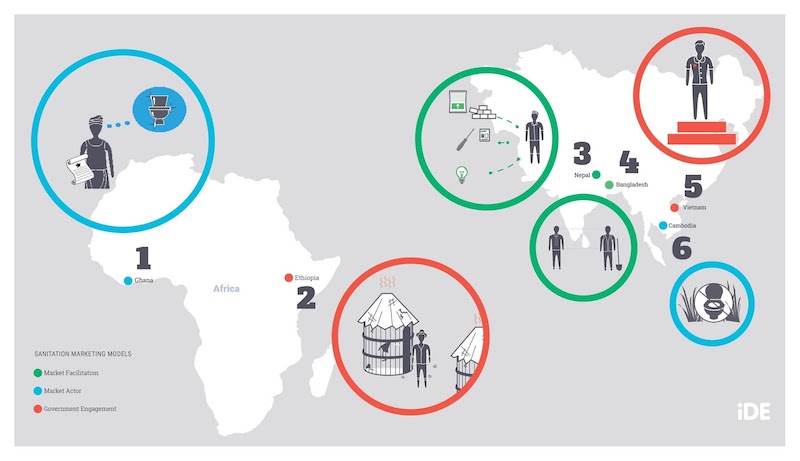Learning from Market-Based Sanitation at Scale
Working through the private sector is one of the most promising approaches to solve the global sanitation crisis. Yet globally, few market-based sanitation programs have reached significant scale. Indeed, a forthcoming report from USAID’s WASH Partnerships for Learning and Sustainability (WASHPaLS) project identified only 18 single-country, market-based sanitation programs that had increased sales by at least 10,000 toilets.

iDE launched the first, and currently runs the largest, improved rural market-based sanitation program in the developing world. The first known program to be called a “sanitation marketing” program was designed and implemented by iDE Vietnam in 2003. Today, iDE’s WASH portfolio includes sanitation market development programs in six countries across Asia and Africa. Most recently, iDE Bangladesh sold 200,000 toilets in 18 months under a project funded by the Dutch Ministry of Foreign Affairs, building on learnings from Vietnam and Cambodia. Since 2009, iDE has facilitated the sale of more than 650,000 improved toilets to rural households globally. iDE recruits business leaders to run programs and nurtures a culture of cross-country learning to share successes and failures. This culture is a critical factor in scaling innovation because responding to market changes requires flexibility and creative problem-solving.
On April 19, 2018, USAID hosted a webinar featuring iDE Global WASH Director Yi Wei, iDE Vietnam Country Director Quang Nguyen, and iDE Cambodia WASH Director Michel Dauguet who discussed how iDE has achieved impact at scale and how market-based programs can evolve in response to changes in the market. The webinar was moderated by Jesse Shapiro, Environmental Health Team Lead, Senior WASH Advisor, and Sanitation Focal Point for USAID's Bureau for Global Health.
Getting to Scale
Designing to context. Using human centered design (HCD), iDE considers customer needs and aspirations, local market conditions, and the regulatory environment to design a WASH intervention that suits the local context. For example, in Vietnam, where the government is highly involved in WASH, iDE builds local government capacity to engage with the private sector to deliver inclusive WASH solutions, rather than engaging directly with private sector actors. This Tactic Report provides more details on how iDE is implementing this approach with funding from the Department of Foreign Affairs and Trade (DFAT).

Segmenting the market. To efficiently allocate program resources, iDE segments the customer base into three sweeps (see diagram at right): those who are willing and able to pay cash; those who are willing to purchase but need financing options; and those who need financing and some level of subsidy. By targeting these segments with different approaches and at different times, it is possible to quickly increase uptake among those willing and able to pay while reserving scarce subsidy funds for those who truly need them.
Image credit: iDE
Adapting to Market Changes
Reaching late adopters. Laggards have different needs and constraints than early adopters. Customers who didn’t buy a toilet early on often need financing or subsidies. With funding from DFAT, TripAdvisor Charitable Foundation, and Stone Family Foundation, iDE Cambodia is exploring ways to reach these customers, including supplier-led financing and targeted subsidies.
Strengthening sanitation businesses. As the market matures, businesses need to evolve to stay profitable; simply providing a high quality toilet at an affordable price is no longer enough. Yet few small businesses are capable of managing sophisticated processes such as assessing customer creditworthiness or structuring financing options. iDE’s Cambodia program recently developed an initiative to train women (who often serve as bookkeepers in the family business) to administer installment payment plans to better meet the needs of poor households. This pilot is designed to improve women’s professional skills, economic empowerment, and confidence and credibility when making business decisions. Initial results are promising and the pilot will soon be expanded into additional provinces.
Diversifying product options. As more households purchase latrines, it becomes less profitable for businesses to focus only on standard latrine sales. As the first latrine market shrinks, these businesses should expand to include complementary and more inclusive products and services, like sanitation and hygiene products that can be modified for people living with disabilities, latrines for flood-prone regions, and fecal sludge management (FSM). Doing so contributes to efforts of achieving universal coverage and helps the enterprise maintain a market and remain in business.
Responding to Emerging Needs
FSM. Getting households to purchase a latrine is only one step on the way to safely managed sanitation. Without an easy and hygienic way to empty latrine pits, customers face future health hazards when toilets break or overflow. iDE Bangladesh addresses this problem with a latrine pit filter (FilTo) that extends pit fill times and reduces groundwater contamination. This technology, originally designed for use in areas with high groundwater and seasonal flooding, is showing promise. To date, more than 10,000 have been sold under projects funded by the Dutch Ministry of Foreign Affairs, UNICEF, and the Swiss Agency for Development and Cooperation. iDE Cambodia is also piloting solutions suitable for rural customers, including a dual pit upgrade that allows the full pit to be safely composted and emptied on site.
Financing. Rural households often have insufficient credit history to receive a WASH loan through a formal institution. With funding from Global Affairs Canada, iDE Ghana’s Sama Sama program is working with EFL to make credit decisions based on customer responses to a psychometric survey that assesses how he or she manages money, attitude, and ethics compared to other customers in the same country. Using these data, the survey predicts a customer’s credit risk relative to his/her peers and significantly speeds up the credit assessment process.
Find out more about iDE’s approach to market-based sanitation by listening to the webinar recording or visiting iDE’s website for additional resources.
By Molly Goodwin-Kucinsky, iDE’s Global WASH Knowledge Manager. By designing to context, targeting approaches for different market segments, adapting as markets change, and proactively addressing emerging issues, iDE enables micro-entrepreneurs to sustainably deliver affordable, aspirational, and inclusive WASH products. To date, more than 3 million people have benefited from these interventions.


